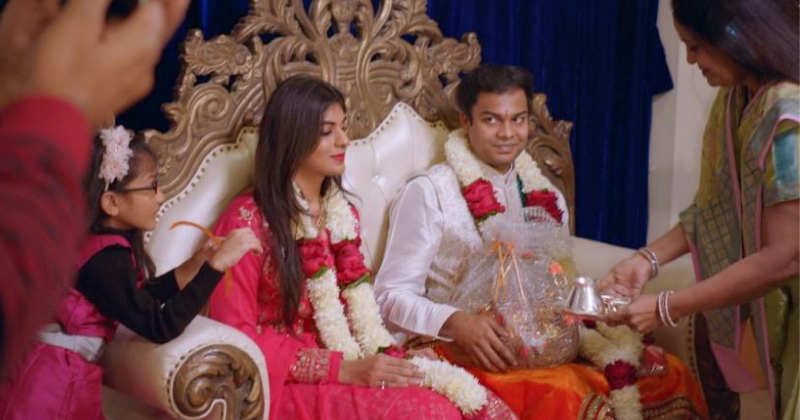Just A Mirror
There are the Rude and the Entitled, the Mama’s Boy, the Pleaser, the Empowered Woman, the Nice Guy and the Divorcee. They are just some of the divisive candidates (characters?) in Netflix’s popular reality show Indian Matchmaking, and it is the tea surrounding them that propelled it to the top of your playlist in lockdown season. A modern take on arranged marriages the Subcontinental (and dare I say upper class?) way, Indian Matchmaking was trending almost as soon as it appeared on the playlist. And viewers were binge watching, endlessly dissecting and having heated arguments with co-watchers as soon as they locked eyes with their screen.
Conversations around the practice of matchmaking and arranged marriages are bound to be charged and contentious in a world where individual agency has frequently started taking precedence over social norms. In an age where you can tweak everything, from your playlist to your greater experiences in life, how easy or difficult is it to pick a partner without the urge to tweak him or her? (Very difficult).
Are a generation and social class used to personalising their experiences, ready to compromise and give their all for matrimony? (Not really) Can professional matchmaking help you find the appropriate match? (Maybe, but will you hit it off, is the big ask) What is an appropriate match anyway? (Watch the show to find out what it is not) Can professional matchmaking –a proud product of patriarchy – work in a world progressing towards the empowerment of women? (Watch the show to find out why it is not working).
In the show, matchmaker par excellence, Sima Taparia explores all this and more simply by doing her job. By marrying (pun intended) the matchmaking process with the dating process, she attempts to upgrade this ancient custom and make it more palatable to her worldly wise clients and Netflix’s audiences. The result is a show that works simply because it is so relatable. It has all the elements of real-life human drama, Taparia’s clients are stood up, frustrated with the search and dealing with mounting family pressures and generally displaying flaky behaviour. Sounds familiar, right?

If, like me, you grew up thinking a professional matchmaker was the last resort for people left on the shelf, Taparia from Mumbai, will put your notions to rest. The central figure in the show, she jet sets between India and the US, in search of high quality matches for her clients and frequently consults astrologers and face readers to earn an honest living - and give us endless fodder for dinner party conversations. Her clients are far from has-beens past their sell by date. Most are accomplished and many are presentable if not outright attractive. If you are a Pakistani woman you might be left wondering if all the right men are NRIs whose last dates were called Aparna and Nadiya. (Yikes! Are we allowed to say that?). No surprises then, that the candidates have complicated demands in what they seek in a partner (‘he must be keen to visit the Bolivian salt flats during the rainy season’ says Aparna, as you Google this and wonder if ‘he’ will enjoy that experience in her sullen presence). Other candidates, like Pradhyuman and Akshay are commitment phobes doing the arranged marriage circuit under family pressure.
Of course Indian Matchmaking’s version of arranged marriages is not how it works for most people in the Subcontinent. With the level of personal choice that Taparia’s candidates demand, it kind of doesn’t remain an arranged marriage anymore. So no surprises again when you discover that despite some promising dates, none of the candidates end up together. Even the boy who was bullied into an engagement to please mommy, broke it off.

What Indian Matchmaking’s candidates are looking for is arranged love - basically the PG version of Tinder that involves families. As Taparia struggles to adapt the process to modern times, it becomes clear that her hybrid love-arranged-woo woo process suffers from the same malaise that haunts dating app users; when you have that level of choice in life and when you believe that your perfect match could be a swipe away, why on earth would you settle?
As for the ‘controversy’ surrounding the show, I really didn’t ‘see’ anything controversial in the show per se. And if you are South Asian, you probably won’t either. So I Googled the ‘controversy’ and apparently Indian Matchmaking has been criticised for normalising caste, being okay with sexism and colourist. Throw in a mother-in-law looking for a ‘flexible bahu’ for good measure. So the ‘controversy’ is about all things that South Asian culture has normalised. I still don’t see the storm surrounding Indian Matchmaking. The show is entertaining, but it is not controversial. It is just a mirror.
Shahrezad Samiuddin is a pop culture junkie and a scriptwriter. shahrezadsamiuddin@yahoo.com.




Comments (12) Closed